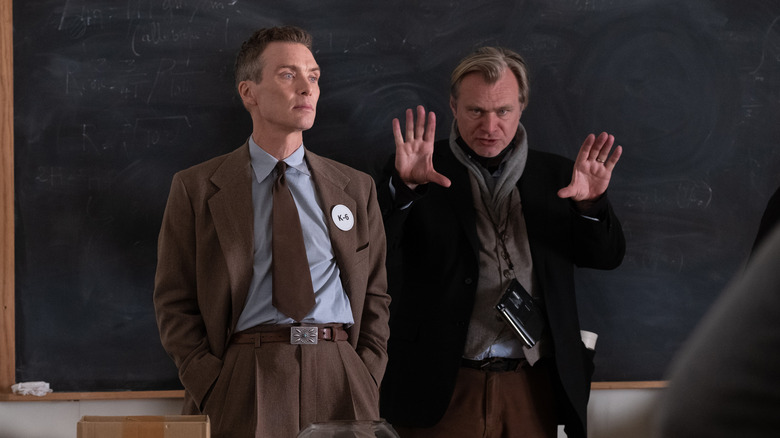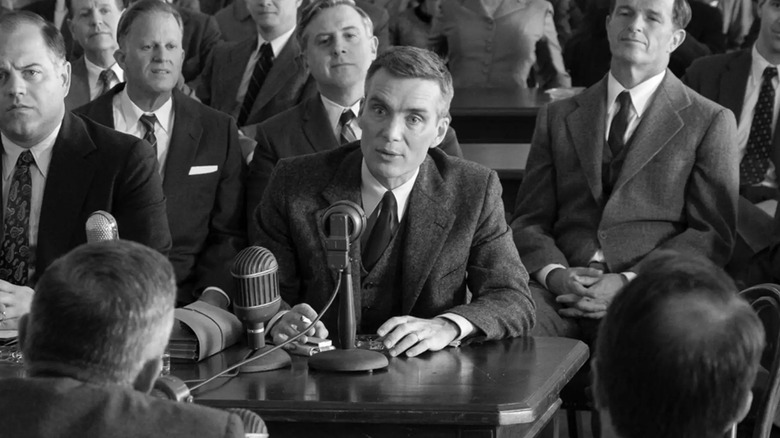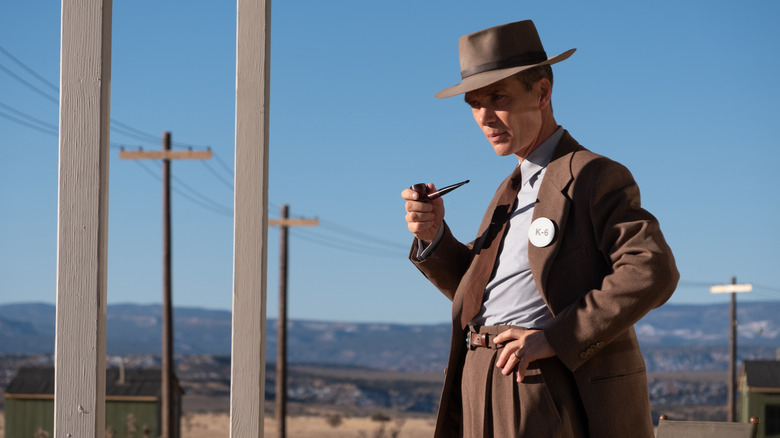Oppenheimer's Cillian Murphy On Peaky Blinders Parallels And The Appeal Of Christopher Nolan [Exclusive Interview]
In some ways, Cillian Murphy might be the most relatable of all the most recognizable, name-brand actors. He always shows up ready and prepared for a hard day's work, clearly loves putting in the effort to hone his craft until it's the best that it can possibly be ... and he also happens to harbor a deep, intense aversion towards the more obligatory aspects of the job. Honestly, who could blame him? However, that well-founded apathy towards having to act as an extension of the studio's marketing division only makes it that much more impressive to be the millionth person to sit across from him on the day of a major press junket, ask him about the finer points of his performance in a movie as epic and complex as "Oppenheimer," and realize that he still puts an awful lot of thought into each and every answer. That's a true professional, folks.
Perhaps that helps explain why Christopher Nolan came knocking at his door with the lead role that Murphy has always deserved. After various supporting appearances throughout movies such as "The Dark Knight" trilogy, "Inception," and "Dunkirk," the actor gives his greatest performance of them all as the controversial and deeply paradoxical figure of J. Robert Oppenheimer, the father of the atomic bomb. It's no surprise to hear the joyous first reactions to the film, particularly given the dark places that Murphy goes in bringing this character to life. In an interview conducted before the SAG-AFTRA strike, I was able to scratch the surface of how the actor approached this role, whether he saw any parallels between "Oppenheimer" and Tommy Shelby from "Peaky Blinders," and the appeal of working with Nolan.
Note: This interview has been lightly edited for clarity and brevity.
'That's where the most interesting drama is, in the gray area'
With you and Chris Nolan working together yet again, how much has your process and your dynamic with him changed being a lead as opposed to the supporting roles that you've been in years prior?
Well, I just get to be on set more [laughs]. I loved it. I mean, I absolutely loved it. He's just one of the greatest directors we have at the moment making films, and I have learned so much from working with him. I said to him at the beginning of this, "Just push me, Chris. I do my best work when I'm pushed." And he's the best director for that because he really, really, really pushes you.
Have you noticed how much he's evolved as a filmmaker over the years, and even yourself as an actor working with him?
I think he's refining his vision as a filmmaker. I think if you look at the progression of the films, I think this may be his magnum opus. And we've both gotten older [laughs], we've both had kids. I've gone off and made lots of other work, but I love coming back to work with Chris. There is no set that runs as smoothly and as calmly and as efficiently as a Chris Nolan set. I've never been on a set like that. Everyone is laser-focused on their work.
As a "Peaky Binders" fan, I couldn't help but notice how much Oppenheimer and Tommy Shelby are, maybe not cut exactly from the same cloth, but are both complicated protagonists and you wouldn't necessarily call them a hero or a villain. They have that shades of gray aspect to them.
Yeah.
Did you feel that when you're reading the script, and do you feel like you're drawn to that particular archetype?
Yes, I am drawn to that type of character. I think they're the most interesting. I didn't see any particular parallels between Oppenheimer and Tommy — they both smoked a lot of cigarettes [laughs]. But I do find those characters fascinating because they're not easy to access for the performer and they're very enigmatic and alluring, I think, to the viewer. And I also think that's where the most interesting drama is, in the gray area.
'We were doing Chris' version of the story'
Portraying a figure who is drawn from actual history as opposed to fiction, did that change your process at all? Did you go back and read the book that Nolan based this movie on?
Yeah. Yeah, for sure. I read so much more and there is a level of responsibility, completely. But we were aware that we were doing Chris' version of the story and this was our interpretation of the story. And my representation of Oppenheimer was a synthesis of Chris' version of him, what I had gleaned from all of this archival material, and I guess you bring out elements of yourself to it.
With a filmmaker like Nolan, he's always so obsessed with time and his movies are always edited so compellingly. This movie spans so many decades of Oppenheimer's life, and obviously actors don't typically film in chronological order and in sequence. Did all that make your process any more challenging than usual?
It's always challenging like that, but it wasn't as challenging as "Inception" [laughs], for example, but it was really, really — you just got to know that script inside out. You got to be completely familiar with it. And I carried that script with me from every single day and I knew it like the back of my hand. So that's the only way. And then obviously you lean on Chris, because it comes from here [points at head]. So he knows every single frame, every single scene. He's just going to be your guide.
"Oppenheimer" arrives in theaters on July 21, 2023.


